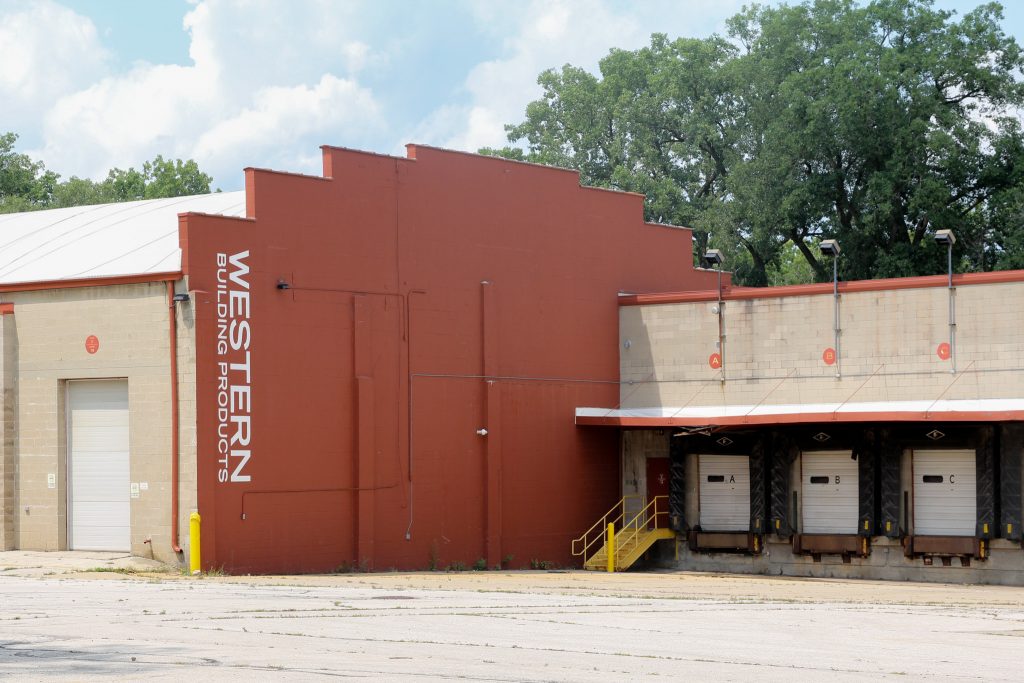Wisconsin Has A “Smart Growth” Law To Encourage Housing, But No One Is Enforcing It
Planner Robin Palm has been willing to go to court over a proposal in Wauwatosa.

Vacant buildings previously used by Western Building Products, a millwork products distributor, sit on a 10-acre plot of land in the Milwaukee suburb of Wauwatosa, Wis., on Aug. 1, 2023. After plans for a multi-family housing development on the site fell through, the Wauwatosa Common Council voted to allow a storage company to occupy the site. (Jonmaesha Beltran / Wisconsin Watch)
This story was originally published by Wisconsin Watch
Robin Palm lives in Milwaukee and works for the village of Mount Pleasant, but he’s willing to metaphorically die on a hill in Wauwatosa in the name of affordable housing. Or more precisely, on a 10-acre plot of land in the Milwaukee suburb.
The 42-year-old urban planner saw great promise in that Wauwatosa land, home to multiple industrial buildings. It’s near Milwaukee Regional Medical Center, the city’s largest employer; top-rated schools; and The Village business district. It’s also the only location in Wauwatosa’s comprehensive land development plan that’s classified for the highest density of multi-family housing.
Two developers initially planned to build six apartment buildings at the site. The project would have brought 475 units, including 77 designed for lower-income workers. Palm called that a “win” for a city where 92% of the workforce lives elsewhere.
But after the project’s funding fell through, the Wauwatosa Common Council voted in March to allow a storage company to occupy the space. Council members cited concerns about otherwise leaving the property vacant.
The decision infuriated Palm, who constantly hears about southeast Wisconsin’s housing crisis. It also conflicted with the city’s development plan at a time when county leaders aim to add affordable housing in Wauwatosa and other suburbs to ease the region’s racial segregation and boost opportunity.
So Palm, a regional representative in the American Planning Association’s Wisconsin chapter, is pushing back. He sued Wauwatosa’s zoning administrator after the city’s Board of Zoning Appeals declined to review his complaint related to the decision.
Palm has no personal stake in the matter, and his lawsuit has thus far failed to gain traction in court. Wauwatosa Mayor Dennis McBride says the challenge lacks merit, and he defends his city’s commitment to affordable housing.
“In sheer numbers of projects, we probably are the leader in suburban Milwaukee,” McBride told Wisconsin Watch.
But Palm said he filed the lawsuit to make an argument that transcends the fate of one property: Local governments should follow their own state-mandated plans for affordable housing.
The Wisconsin Legislature enacted a “Smart Growth” law nearly 25 years ago requiring local governments to craft plans to guide land use decisions. Although the law says such plans must be consistent with local zoning ordinances, it lacks enforcement, yielding no consequences for disregarding it.
“Generally speaking, no, that law does not have a lot of teeth,” said Kurt Paulsen, an urban planning professor at the University of Wisconsin-Madison.
Communities in other states may lose funding or face lawsuits from local developers when they violate state-mandated plans, he added, but not in Wisconsin. “So there’s really no way to enforce that law.”
Absent intervention by courts or lawmakers, Paulsen says, leaves the burden on residents to ask their village boards or city councils whether they are meeting their legal obligations to provide a range of housing options to residents.
Wisconsin’s Smart Growth law emerges
Wisconsin lawmakers have long been reluctant to meddle in local planning. But concerns about urban sprawl and a shortage of affordable housing spurred the Legislature to enact the Smart Growth law, which Republican Gov. Tommy Thompson signed in 1999. It applies to a range of government units, including cities, towns, villages and counties.
Some local officials welcomed the law. Others grumbled. An Ozaukee County supervisor in 2008 called it “lousy legislation that forced us to do something that we were going to get around to doing eventually” as the county finalized its mandated land use plan.
Amid other provisions, the law requires local, county and regional governments to detail plans for “a range of housing choices that meet the needs of persons of all income levels and of all age groups and persons with special needs.” The law says that if a government “enacts or amends” certain zoning or mapping policies, the changes must be consistent with their comprehensive plans.
But the law does not spell out enforcement mechanisms, and courts have not set precedent on how it should be interpreted.
Th Milwaukee County suburb of River Hills — which has allowed only single-family homes, mostly on multi-acre lots, since its incorporation in 1930 — faced allegations of violating the Smart Growth law in a 2019 lawsuit, but the dispute was settled out of court.
Some local government officials initially thought the law also required decisions over conditional use permits — zoning exceptions granted to property owners — to comply with their comprehensive plans. But Gov. Scott Walker in 2016 signed a law stating: “A conditional use permit that may be issued by a political subdivision does not need to be consistent with the political subdivision’s comprehensive plan.”
Wisconsin still has a housing crunch, particularly for those with lower incomes. The state is short about 127,000 affordable rental units for its roughly 196,000 “extremely low-income” renter households — defined as a family of four making less than $26,500, according to the National Low Income Housing Coalition.
Kori Schneider-Peragine, senior administrator of the Metropolitan Milwaukee Fair Housing Council, said she once held “great hope” for the Smart Growth law, thinking it might prompt communities to loosen up zoning laws that put land off limits to multi-family rentals.
That hope has since waned, despite her attempts at optimism.
“I try to put hope behind whatever I can find because sometimes it’s really scarce,” Schneider-Peragine said.
Wauwatosa touts affordable housing commitment
Wauwatosa has a history of excluding people of color and low-income renters through zoning regulations that prohibited larger apartment complexes. That included some of the most prevalent uses of racial covenants back when many subdivisions were founded and before the U.S. Supreme Court ruled such practices unconstitutional, Palm said.
But the city has since embraced affordable housing and welcomed more developments offering subsidized units in the last five years than other nearby suburbs, said McBride, the mayor. That included two developments financed through the county’s initiative to add more affordable housing to its suburbs.
Palm wishes the 10 acres at the center of his lawsuit remained available for additional housing.
He tried to appeal the storage facility approval to the city’s Board of Zoning Appeals. Board officials refused to process the appeal, saying they lacked power to overturn the Common Council’s action. Palm countered that the council’s conditional use permit vote should be considered “administering and enforcing the zoning code” — an administrative action under the board’s jurisdiction.
When the board refused to budge, Palm sued in Milwaukee County Circuit Court.
Granting the storage company a permit conflicted with the city’s 2008-2030 comprehensive plan, whose “Future Land Use” section classifies that 10 acres as “Multi Family-Urban Density,” required for most multi-unit affordable housing projects, according to Palm’s lawsuit. It’s the only parcel listed in that category.
Milwaukee Circuit Court Judge J.D. Watts dismissed the suit after an August hearing, agreeing with Wauwatosa officials that it lacked merit.
Courts were not the appropriate venue to make Palm’s case, Watts said from the bench. The Legislature never intended for people to flood the courts whenever local officials did something with which they simply disagreed.
Palm requested Watts to reconsider the dismissal and argued that the case rests solely on whether the zoning administrator was authorized to deny his application to appeal the permitting decision. Watts scheduled a hearing for Jan. 31.
McBride expects the hearing will yield the same result as the first one.
“There is no merit to Mr. Palm’s lawsuit or his request for reconsideration, and his time for appeal has passed,” McBride wrote in an email.
City leaders wanted to add housing on the 10 acres, McBride said. It houses buildings formerly used by Western Building Products, which distributes millwork products. But redevelopment would be too pricey, requiring building teardowns and soil remediation. The city and the developer searched for financing for a year and a half without success, McBride added.
“Everybody wanted affordable housing there. So it’s a ridiculous lawsuit,” he said of Palm’s challenge.
Alderperson Joel Tilleson, one of five council members to oppose the permit for the storage company, said the previous housing development was consistent with the city’s comprehensive plan and Life Sciences District Master Plan, an area of Wauwatosa that has seen exponential growth over the last 20 years and has a demand for housing.
“Master plans are only worth their weight if we honor them, and we honor the time and the effort and money that we put into them,” Tilleson said in March before the Common Council approved a plan to permit Hansen Storage Co. to build warehouses and offices at the site.
Alderperson John Dubinski said he was disappointed the housing project fell through, but he worried about the consequences of leaving the property vacant.
“Being on a railroad line, being along the river, it’s nothing but trouble looking at us,” he said at the March meeting.
Palm sees it differently. He thinks the council should have waited until another housing developer arrived to try again.
“This property is worth fighting for,” he said.
The nonprofit Wisconsin Watch (www.WisconsinWatch.org) collaborates with WPR, PBS Wisconsin, other news media and the University of Wisconsin-Madison School of Journalism and Mass Communication. All works created, published, posted or disseminated by Wisconsin Watch do not necessarily reflect the views or opinions of UW-Madison or any of its affiliates.
If you think stories like this are important, become a member of Urban Milwaukee and help support real, independent journalism. Plus you get some cool added benefits.
-
Wisconsin Lacks Clear System for Tracking Police Caught Lying
 May 9th, 2024 by Jacob Resneck
May 9th, 2024 by Jacob Resneck
-
Voters With Disabilities Demand Electronic Voting Option
 Apr 18th, 2024 by Alexander Shur
Apr 18th, 2024 by Alexander Shur
-
Few SNAP Recipients Reimbursed for Spoiled Food
 Apr 9th, 2024 by Addie Costello
Apr 9th, 2024 by Addie Costello






















Wauwatosa continues it’s racist housing tradition.
These goals are outdated. They fail to take into account climate change and the role development has in driving it. The time for feel good plans is over. Continuing to deny development drives climate change is madness.